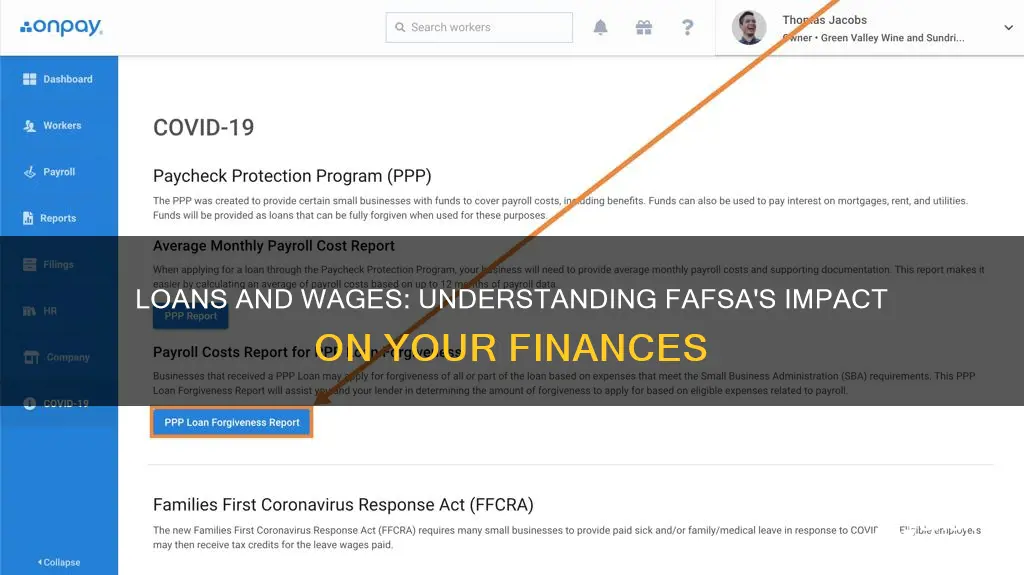
The Free Application for Federal Student Aid (FAFSA) is a process that determines a student's eligibility for need-based federal financial aid for college. The FAFSA considers a student's financial situation, including their income and assets, to determine their eligibility for aid. While loans are considered on the FAFSA, they are not treated as taxable income. Federal and state-sponsored student loans are not considered taxable income, and interest paid on these loans may be tax-deductible if used for school-related expenses. However, earnings from work-study awards are fully taxable and must be included as wages and salary on tax returns.
| Characteristics | Values |
|---|---|
| Are FAFSA loans treated as taxable income? | No, FAFSA loans are not treated as taxable income. |
| Are earnings from work-study awards treated as taxable income? | Yes, earnings from work-study awards are treated as taxable income and must be included as wages and salary on tax returns. |
| Are state-sponsored student loans treated as taxable income? | No, state-sponsored student loans are not treated as taxable income. |
| Are Pell grant funds treated as taxable income? | Pell grant funds are not treated as taxable income if used for tuition, fees, books, supplies, and equipment. |
| Are FAFSA loans considered as wages? | No, FAFSA loans are not considered as wages. |
| Do outstanding loans affect eligibility for FAFSA? | Most forms of consumer debt, including auto loans and credit card debt, are ignored by FAFSA. Loans are considered on FAFSA if they are secured by an asset that is reported on FAFSA. |
What You'll Learn

Student loans are not considered taxable income for FAFSA
The FAFSA, or Free Application for Federal Student Aid, is the key to obtaining various types of federal financial assistance for college education. Many states also offer additional financial assistance to students who submit a FAFSA. Any award you receive from the state is subject to the same federal income tax treatment as awards from the federal government. For example, if you receive a grant from your state that you don't have to repay, you treat it like a Pell Grant, which requires you to use the funds for specific purposes. All state-sponsored student loans are excluded from your taxable income as well.
Pell Grant funds can be excluded from taxable income if used for tuition, fees, books, supplies, and equipment. However, if the Pell Grant funds are used for unapproved purposes such as room and board, they become taxable income. Earnings from work-study awards are fully taxable and must be included as wages and salary on tax returns.
It is important to note that the tax treatment of FAFSA awards remains the same even if a student withdraws from college, as long as the funds were initially used for college expenses.
Collateral Appraisal: Does Loan-to-Value Matter?
You may want to see also

Interest paid on student loans may be tax-deductible
FAFSA is the key to obtaining various types of federal financial assistance for college education. It is important to note that federal student loan funds are not taxable, regardless of the amounts disbursed, as they are borrowed funds that must be repaid with interest. These funds are always applied last, as any excess funds should be used to pay down loan balances owed to a servicer or for qualified educational expenses.
To determine if you qualify for the student loan interest deduction, you can refer to IRS publications such as "Tax Benefits for Education" and the instructions for Form 1040. If you paid $600 or more in interest to a federal loan servicer during the tax year, you should receive a Form 1098-E, Student Loan Interest Statement, from the entity to which you paid the interest. This form will be used to report your student loan interest payments to the Internal Revenue Service (IRS) and to you.
It is important to note that the student loan interest deduction is gradually reduced and eventually eliminated as your MAGI amount increases. Additionally, the deduction may not be available if you or your spouse were claimed as dependents on someone else's tax return. By deducting the interest paid on your student loans from your taxable income, you may be able to reduce the amount of tax you owe, which can provide a financial benefit.
Kindle Book Loaning: Does It Expose My Library?
You may want to see also

Work-study awards are fully taxable and must be included as wages
The Federal Work-Study Program is designed to fund part-time employment opportunities for students enrolled in an accredited post-secondary institution. Over 3,400 institutions participate in the work-study program. While the program is designed to help students financially, it is important to note that work-study awards are fully taxable and must be included as wages when filing taxes.
Earnings from work-study jobs are considered taxable income, and students must report this income on their tax returns. This means that students need to include the amount earned from their work-study positions on the appropriate line for wages and salary on their tax forms. It is important to note that work-study income is subject to federal and state income tax, but students are typically exempt from FICA taxes (Social Security and Medicare taxes) if they are enrolled in a certain number of credit hours or working on campus.
When it comes to filling out the FAFSA (Free Application for Federal Student Aid), students must include their full work-study earnings, including any taxes withheld. This information is used to determine the student's financial need and eligibility for financial aid. However, it is important to distinguish between work-study earnings and student loans. While work-study awards are considered taxable income, student loans are not. Government and state-sponsored student loans are not considered taxable income, and any leftover money from financial aid is generally not treated as taxable income.
To summarise, while work-study programs provide valuable financial assistance to students, the earnings from these programs are fully taxable and must be reported as wages on tax returns. Students should carefully review their W-2 forms and consult with tax professionals or their university's financial aid office to ensure they accurately report their work-study income and take advantage of any applicable tax credits or deductions.
Loandepot's Loan Sales: What You Need to Know
You may want to see also

Consumer debt is ignored by FAFSA
The Free Application for Federal Student Aid (FAFSA) is a form that students fill out to obtain federal financial assistance for college education. FAFSA asks about income and assets to determine eligibility for financial aid. However, it is important to note that not all assets and debts are reported or considered in the FAFSA calculation.
When it comes to consumer debt, FAFSA generally ignores most forms of it, including credit card debt, auto loans, and other consumer loans. This means that having outstanding consumer debt will not directly increase your eligibility for financial aid. In other words, FAFSA does not take into account your consumer debt when calculating your financial need.
The reason for this is that FAFSA focuses on the net worth of reportable assets when determining financial need. Reportable assets include things like money in savings and checking accounts, investment farms, stocks, bonds, and certain types of real estate (excluding the primary residence). Debts secured by these reportable assets, such as margin loans on brokerage accounts or mortgages on investment properties, are considered and can reduce the net worth of those assets.
However, consumer debts that are not secured by reportable assets, such as credit card debt, auto loans, or mortgages on the primary residence, are not considered in the FAFSA calculation. This means that even if you have significant consumer debt, it will not directly impact the calculation of your financial need for FAFSA purposes. Nevertheless, it is important to manage your consumer debt wisely, as it can still impact your overall financial health and ability to pay for college.
Understanding Loans and Financial Aid: Does Loan Count as FAP?
You may want to see also

FAFSA determines eligibility for need-based federal financial aid
FAFSA, or the Free Application for Federal Student Aid, is a form that students can fill out to determine their eligibility for financial aid for college or graduate school. The financial aid offered through FAFSA can come in the form of grants, loans, and work-study opportunities.
FAFSA is the key to obtaining various types of federal financial assistance for college education. Pell Grants, for example, are awarded based on exceptional financial need and do not have to be paid back. These grants can be excluded from taxable income if used for tuition, fees, books, supplies, and equipment. However, if the grant money is used for unapproved purposes such as room and board, it cannot be excluded from taxable income.
On the other hand, federal student loans are borrowed funds that must be repaid with interest. These loan funds are not considered taxable income and are not included in wages, salary, or tips on tax returns. Additionally, government and state-sponsored student loans are not considered taxable income, but the interest paid on these loans may be tax-deductible if used for school-related expenses.
It is important to note that earnings from work-study awards are fully taxable and must be included as wages and salary on tax returns. Many students are provided part-time jobs working at their college as part of their FAFSA award. While this money is intended to ease the financial burden of attending college, it is still considered taxable income.
Loan Rehabilitation: A Way to Stop Wage Garnishment?
You may want to see also
Frequently asked questions
No, loans are not considered wages for FAFSA. However, work-study awards are fully taxable and must be included as wages and salary on tax returns.
No, loans are generally not considered wages for FAFSA. However, it's important to note that loans secured by assets reported on the FAFSA, such as margin loans for stock market investments, may be considered.
No, federal student loan funds are not taxable, regardless of the amount disbursed. They are borrowed funds that must be repaid with interest.
No, FAFSA loans are not considered taxable income. However, when you begin repaying these loans, you may qualify for a student loan interest deduction if your income is not too high and the funds are used for school-related expenses.
Yes, Pell grants and state-sponsored student loans are also excluded from taxable income.







